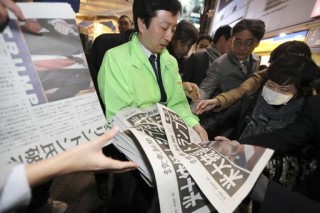Loading
Search
▼ Japanese Business Leaders Trying to Gauge Economic Impact of Trump's Win
- Category:Other
TOKYO — Donald Trump’s victory in the U.S. presidential election Wednesday has surprised and baffled Japanese business leaders, prompting them to try to assess its economic impact and what his presidency will mean for their businesses.
As the United States plays a crucial role as a major export destination for Japanese companies, executives are concerned about the outlook for the world’s largest economy and the possibility of turmoil in financial markets, particularly a further strengthening of the yen.
Some business leaders expressed hope for stronger bilateral ties between Japan and the United States, and said ratifying the 12-nation Trans-Pacific Partnership free trade agreement is vital amid worries about rising protectionism.
“It came out of the blue. I’d say it’s a Trump shock,” said Koei Tsuge, president of Central Japan Railway Co.
Describing the election outcome as a “surprise,” Yoshimitsu Kobayashi, head of the Japan Association of Corporate Executives, said the biggest challenge is for the Japanese government to establish “smooth communications” with the next U.S. administration.
“Mr Trump’s victory could send big shock waves around the world, share prices lower and the yen higher temporarily, and there is also uncertainty about the impact on Japan-U.S. relations,” Kobayashi said.
From the retail sector, Yoshinori Isozaki, president of Kirin Holdings Co, expressed concern at the growing uncertainty about the U.S. political and economic outlooks.
The possibility of Trump, seen as protectionist on trade, defeating his Democratic rival Hillary Clinton roiled financial markets in Asia on Wednesday.
The yen spiked in volatile trading after currency markets had priced in a Clinton victory ahead of the vote. A strong yen bodes ill for Japanese exporters such as automakers whose earnings are sensitive to currency swings. A strong yen cuts into exporters’ overseas profits when repatriated.
“My sense is that the dollar will fall into the 90 yen zone without a respite,” said Tetsushi Tado, president of Nippon Paint Holdings Co.
The leaders of Japan’s major business organizations stressed the robust nature of bilateral ties built up over the years, regardless of political influences.
Sadayuki Sakakibara, chairman of the Japan Business Federation or Keidanren, said Trump’s victory reflected the hopes for change among the people of the United States.
Sakakibara expressed hope that Trump, an experienced businessman, will “understand fully that keeping and bolstering Japan-U.S. relations has significance for both economies and come up with realistic policy steps.”
Akio Mimura, head of the Japan Chamber of Commerce and Industry, called for a “realistic” appreciation of the Trans-Pacific Partnership agreement, saying the free-trade pact signed in February by Japan, the United States and 10 other Pacific rim countries is extremely important for the Asia-Pacific region.
Throughout the U.S. presidential campaign, Trump expressed opposition to the TPP and other free-trade pacts. Tetsuro Toyoda, who heads the Chubu Economic Federation, voiced concern about a growing protectionist streak.
“We hope that protectionism will not spread in the process of future policy implementation,” Toyoda said in a statement.
His organization covers areas in central Japan, including Aichi Prefecture where Toyota Motor Corp is headquartered.
© KYODO
- November 14, 2016
- Comment (0)
- Trackback(0)


